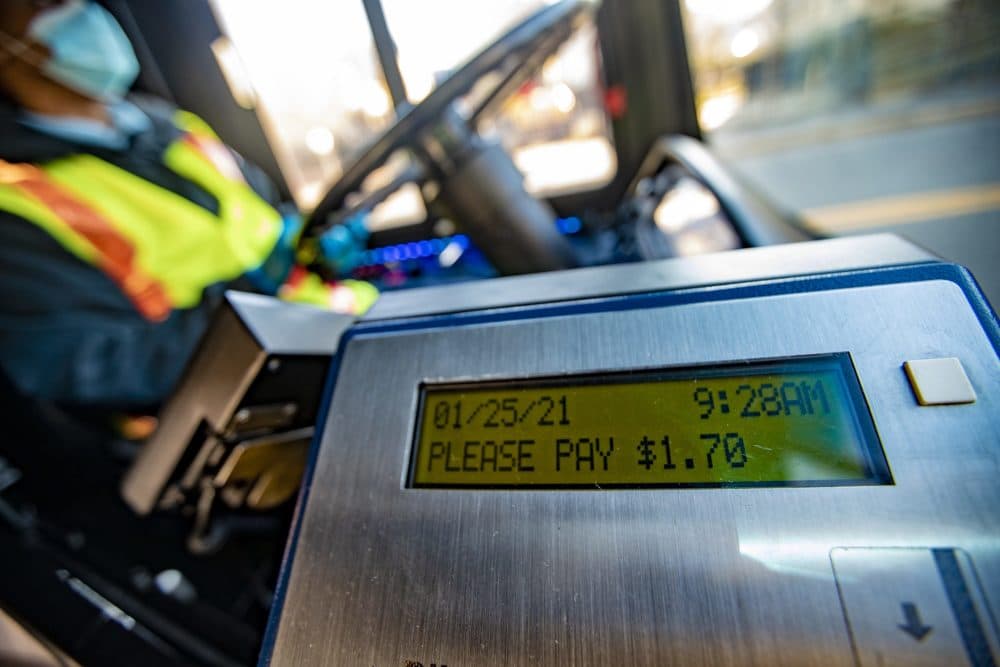Advertisement
Free the T? Some just want a discount

Atiea Kemp just finished an overnight shift at a retirement home, where she works as a nursing assistant.
She relies on the MBTA to get around and says she usually pays $90 for a monthly pass, but sometimes she can't afford it.
“I have to get back and forth to work, so I have to make it happen,” said Kemp, while riding the 28 bus to run some errands before going home. “Sometimes I just skip a month and just do a weekly pass or something like that, and just make it work.”
The 42-year-old lives in Dorchester with her three children, one of whom has a disability. Between her kids, housing, bills and rising costs, she finds one paycheck is not “enough to live.”
“I’m about to work a second job just to keep a roof over my head and pay bills and to basically survive,” she said.
Kemp would like to apply for a reduced MBTA fare — but there is currently no program for people in her situation. Despite years of calls from transit advocates, the T has no income-based discount for adults between the ages of 26 and 64, a group that includes many essential workers, like Kemp.
Right now, the T offers relief to young low-income riders with its Youth Pass, which allows riders between the ages of 18 and 25 to purchase a monthly pass for $30 — a third of the regular price — and receive significant discounts on other fares.
These discounts are also extended to seniors, middle and high school students and people with disabilities. But others are basically on their own.
“There’s programs for the elderly, there’s programs for the teens, but not for regular people that [are] commuting back and forth everyday,” said Kemp. “We need a little break.”
The T has studied low-income fares in other places, including San Francisco, New York, Seattle and Portland. If Massachusetts were to institute a similar program, T officials estimate about 70,000 transit riders could qualify for assistance.
Advertisement
However, officials also estimate that could cost the MBTA between $52 million and $112 million each year, an expense the agency can’t afford, according to Lynsey Heffernan, the T's assistant general manager for policy and transit planning.
“We don’t yet have a source of funding for that, but it continues to be something that we are eager to support and move forward with once those solutions can be found,” Heffernan said.
The T is considering fare changes that could help some riders. The plan includes a price reduction for a one-day pass and more transfer options. It also calls for expanding some of the options available for low-income youth, seniors and others who already qualify for reduced fares. Advocates, like María Belén Power of the nonprofit GreenRoots, say it’s a start, but the agency must do more.
“I think it's great, but I also think that we don't want to lose sight of a low-income fare, and what that would mean for the whole region,” said Power.
Last January, state lawmakers passed a transportation bond bill that included a measure that required the T to establish a low-income fare program to serve more riders. Gov. Charlie Baker vetoed that part of the bill.
“More study is needed to understand how transit authorities can implement fare systems that depend on gathering information about riders’ incomes and to understand what the revenue loss would be and how that revenue would be replaced,” Baker wrote in a letter to lawmakers explaining his decision.
T officials plan to discuss low-income fares with the agency's oversight board this week.
Power and other transit advocates say they plan to continue pushing for a more comprehensive low-income fare program. For the time being, Kemp and thousands of other riders will have to make do.
“Things are costing more, kids need more,” said Kemp. “I gotta do what I gotta do. It’s life.”
This segment aired on February 22, 2022.
